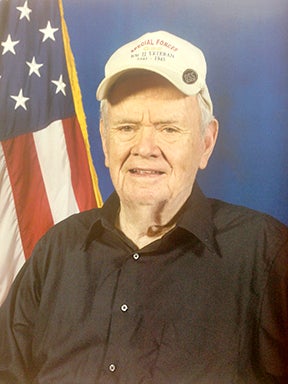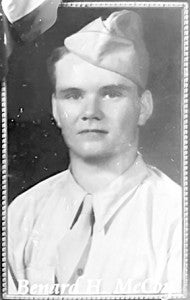Bishop had colorful past as U.S. covert operator
Published 8:46 am Tuesday, November 17, 2015

- B.H. McCoy
It was fitting that the Rev. B.H. McCoy was eulogized on Veterans Day.
Just days earlier, the 90-year-old died at Medical Center of Southeast Texas from a sudden illness, leaving behind a life as colorful as it was long while taking secrets with him to the grave.
Though most in the Golden Triangle area knew Bernard Horace McCoy as a bishop at First United Pentecostal Church in Port Arthur, it was his military service that drew people from far and wide to a mass last Wednesday, and to his funeral Thursday.
During World War II, while serving in the U.S. Army, McCoy was selected to be part of the Office of Strategic Services, a covert group that paved the way for the nation’s Central Intelligence Agency.
The OSS was a secret military organization that performed activities such as collecting intelligence by spying, waging war by propaganda and sabotage, equipping and training anti-Nazi resistance groups in Europe, providing military training for the anti-Japanese guerrilla movement in Asia, among other things.
“He was a leader in his group, was based in Paris, he shook hands with Winston Churchill, went to great lengths to deliver a personal message to George Patton and saw General Eisenhower frequently, “ his son, Darrell McCoy, said.
He served his country three years from June 1943 to March 1946, but spent most of that time in the OSS.
McCoy said his father first came to the attention of the OSS for a reason that might surprise some.
“It was his typing. He could type more than 100 words per minute,” McCoy said. “Back then they did a lot of teletypes, so his typing ability was quite an asset.”
Once that discovery was made, the young soldier was asked if he would be willing to go beyond the call of duty. When he said yes, they told him he would not be serving his country in a foxhole.
Once selected for the undercover operation, B.H. McCoy’s family was questioned.
“I remember my grandmother telling me how they questioned his school teachers, his family. She asked if he was in some sort of trouble, and they told her, ‘ma’am, he is being chosen for a very good position.’”
During his service with the OSS, B.H. McCoy was dispatched to Paris, where he was over the communications office.
“All messages came in and out of that office. They did the coding and decoding. They sent messages to the president’s office and the generals,” McCoy said. “One of the men that reported to him daily carried Adolph Hitler’s briefcase. He was Hitler’s aide, but he was one of our agents. He was a spy,” Darrell McCoy said.
After the Germans were driven out of France, B.H. McCoy was put in charge of a program to stabilize the economy there.
“French money was not good because Germany had come in and destroyed so much. America was buying their money to bring its value up. It was a big project. They were all undercover,” he said.
Once the war was over, the nation had plans for B.H. McCoy.
Darrell McCoy said when his father returned to the U.S., officials wanted to send him to language school at George Washington University in Washington D.C. to prepare him for a mission in China. He was officed in the Eisenhower Executive Officer Building next to the White House, the younger McCoy said.
When B.H. McCoy received a furlough and came back to his then-home in Lufkin, he began to reassess and decided to decline the offer, asking for a discharge instead.
The decision proved to be ominous.
“About a year later they caught most of the spies sent to China and killed most of them. Some walked out on foot, just a handful of them survived,” Darrell McCoy said. “He always felt like it was the hand of the Lord in his life that stopped him from going to China.”
Perhaps it was.
After coming home to East Texas, B.H. McCoy started married life with Archie Myrle Moorehouse, the woman he had married right before going into the service.
He attended college at Stephen F. Austin University, where he earned a degree in agriculture and a psychology of counseling degree.
“He planned to be a teacher, but he became a preacher,” McCoy said.
B.H. McCoy brought his family to Port Arthur in 1969.
He was pastor of First United Pentecostal Church of Port Arthur and the “Bishop” senior pastor in his later years.
During his ministerial career, B.H. McCoy served on the executive board with United Pentecostal Church International and on the Texas District United Pentecostal Church International.
He preached many conferences worldwide and in almost every state.
But he never forgot his military service.
For 30 years, he was over United Pentecostal Church International’s flag ceremony, but few knew about his service with the OSS.
“Dad was so modest, you never heard him talk about these things,” McCoy said.
B.H. McCoy’s daughter, Angela Horn, wrote a book entitled, “Phantom 7 Secret Heroes of WWII and OSS,” which detailed some of the recollections her father and his cohorts shared.
Until his death, B.H. McCoy was the remaining survivor of his branch of the OSS, and perhaps the last that could have shared information the McCoy children asked their father for years.
“All in the OSS had code names. As long as he lived, we did our best to get Dad to tell us his code name, but he said no, it would not be safe,” McCoy said.
It is only fitting that their father’s mass was on Veterans Day, McCoy said.
“It was just natural because Dad was someone who was selfless and just gave himself to his country,” Darrell McCoy said. “He and the other OSS members gave themselves to the defense of this nation.”
Email: sherry.koonce@panews.com
Twitter: sherry.koonce@panews




